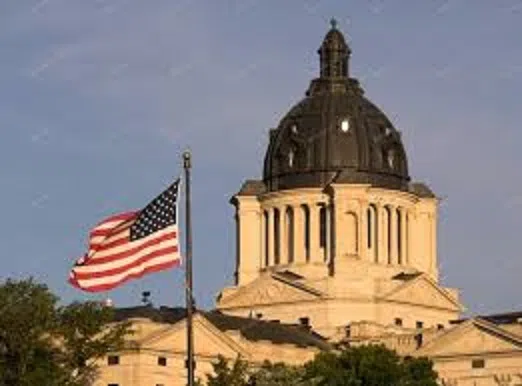
State Capitol in Pierre
By: John Hult
PIERRE, S.D. (South Dakota Searchlight) — More than a dozen states have passed or are considering laws to require porn sites to ask adults who want to visit them for personal information to prove their age.
So far, each of them — including Texas, whose law had an audience with the U.S. Supreme Court last month — have applied the rule to sites on which a third or more of the content counts as pornography.
South Dakota could soon be the first state to affix the expectation to any site that hosts any pornography in the “regular course of the website’s trade or business.”
On Wednesday at the state Capitol, the Senate voted 34-0 to send that bill to the desk of Republican Gov. Larry Rhoden.
“It’s a huge step forward,” said Sen. Jim Mehlhaff, R-Pierre, a prime sponsor of House Bill 1053. “It’s time to jump on board and protect our children from pornography on the internet.”
No senators spoke against the bill on the Senate floor. The Senate Judiciary Committee spent more than an hour hearing testimony on age verification on Tuesday, however.
There was broad agreement in the committee room on the need to address the omnipresence of online pornography.
“It used to be years ago that when we went into schools, we only heard the word ‘porn’ in schools. Then it became middle school,” said Holly Strand, a Rapid City forensic interviewer in child sex crime investigations. “About five years ago, we had a kindergartner ask us how to handle pornography. It was all downhill from there.”
Two options: One-third porn or any porn?
The Senate panel had two options for age verification on its plate Tuesday.
Each aimed to force adult sites to ask visitors for something like a credit card or state-issued driver’s license to prove they’re old enough to be there. Both required the deletion of that data after the visit. Each would let South Dakota’s attorney general levy criminal fines against companies that don’t comply.
One of them, Senate Bill 18, rejected by the committee, follows the model of Texas by targeting sites where one-third of the content is adult material.
HB 1053 draws no such line.
The House bill came from Rep. Bethany Soye, R-Sioux Falls. On Tuesday, she said the one-third figure was pulled from thin air by Louisiana lawmakers looking to preempt concerns about an overly broad restriction in their age verification legislation.
“Every state just blindly copied them,” said Soye, who is an attorney. “And I think that we can do better than that.”
To her, the one-third standard amounts to an invitation for porn sites to find ways to keep their total adult content just below the line, perhaps at 29.9% pornography.
“You can already see the loophole,” Soye said.
The Texas law, which is similar to Louisiana’s, had a hearing in the U.S. Supreme Court last month. The justices won’t decide themselves if such laws violate the First Amendment. Instead, the high court is poised to decide how strict lower courts must be as they rule on the constitutionality of age verification laws.
Attorney general to Legislature: I’ll defend whatever you do
Attorney General Marty Jackley told the committee his office would support the state in a lawsuit over either bill.
“I believe this is something that should’ve been addressed by Congress, but in their absence, you have to act,” Jackley said.
He’d prefer to defend the Senate version that mirrors Texas, though.
So would Doug Abraham. He’s the South Dakota lobbyist for The App Association, which bills itself as a trade group for small tech businesses. He said the lack of a standard for how much content needs to be adult material creates “overbreadth” concerns.
Expecting every app or website with potentially pornographic content to ask for personal information from its users is akin to expecting a mall with a liquor store to make sure every visitor is 21, Abraham said.
“You’d be carding everybody who goes into the mall,” he told the committee.
No bill will prevent determined children from accessing pornography, many supporters conceded, but the stricter the rules, the better the chances.
“Even if this prevents one child in our state from earlier exposure to porn, this bill is a success,” said Strand, the forensic examiner.
Constitutional, legal challenge concerns
Samantha Chapman of the American Civil Liberties Union of South Dakota voiced concerns about constitutionality.
“All means of age verification that are currently available to us today present substantial risks to anonymous web browsing and internet privacy, which will create a chilling effect on content that is legally available,” Chapman said.
There are tools available to parents now, she said. There are other approaches that haven’t been tried yet, such as age verification that ties content access to the age of a device’s user.
Beyond First Amendment concerns with HB 1053’s approach, she pointed to worries over the practice of scanning and sharing personal data to access sensitive content. People could intercept the data for use in extortion, she suggested, regardless of a state law’s requirement that data be deleted.
“The mere presence of government-issued IDs being scanned and transmitted online, presents risk, the potential for hackers and thieves, and potentially hostile foreign governments to take that data into and to use it,” she said.
Chapman testified against both bills, while conceding that SB 18 would be preferable because it would sweep in fewer websites.
Sen. David Wheeler, R-Huron, is chair of the Judiciary Committee. He had questions about how broadly HB 1053 would apply, wondering if it could sweep up streaming services like Netflix if the site regularly hosts movies arguably deemed pornographic.
After the committee rejected the other bill, he joined other committee members in voting for Soye’s bill.
“At this point, since I have no other option, I’m going to support 1053,” Wheeler said.




Comments